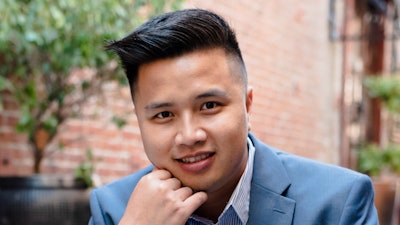One day, while walking to a work meeting at a university in a supposedly progressive Northeast state, I encountered a disheartening sight. A photo depicted an individual holding a sign that read: "Please Speak English." This photo was placed clearly and proudly on a mantel in a student lounge within an office that many non-English speakers frequent. As someone whose first language is Vietnamese, this message felt like a direct attack on my identity and heritage. It was disconcerting to witness such overt discrimination, especially in a professional setting that supposedly champions acceptance and tolerance. The shock of this encounter was amplified by the fact that it occurred at a predominantly white university. Although I should not have been surprised by the existence of such practices, it still caught me off guard and left me feeling defeated.
 Nelson Pham
Nelson Pham
Reflecting on this experience, I am reminded of the words of Minnijean Brown Trickey, one of the courageous Little Rock Nine. During an address at the Harvard Graduate School of Education on Feb. 8, 2018, Ms. Trickey shared her insights on the ongoing struggles of public schools and the pivotal role of educators in driving positive change. One line resonated deeply with me: "When you deny a voice, you deny humanity."
Language is a potent tool in the fight against oppression, which is precisely why practices rooted in white supremacy exert considerable effort to restrict linguistic autonomy. Individuals are denied equitable access to education and coerced into relinquishing their native tongues. The excuses concocted to justify these actions are merely smokescreens for an underlying agenda of deliberate racial discrimination. Policies and practices rooted in such bigotry continue to suppress individuals from diverse cultural backgrounds.
In the realm of higher education, the system's implicit message is clear: conform to the oppressive culture and align with the ideals of the white majority. This expectation harms students of color and those from varied cultural heritages. Educational institutions often look the other way or fail to take proactive measures to dismantle this system. Students who enter these establishments are conditioned to believe that the policies and practices in place are designed with their best interests in mind when, in reality, they primarily serve financial motives.
Students like me, who are already compelled to communicate in English in virtually all facets of daily life, find this expectation particularly burdensome. Whether drafting a memo, completing an assignment, participating in class discussions, or navigating public spaces, we are constantly pressured to assimilate into the prevailing narrative that the English language is inherently superior. Unfortunately, the college or university environment, which should be a defender of free expression, often only extends this privilege to white and English-speaking students.
The lack of space in education for students of color and those from different cultural backgrounds to be their authentic selves is a glaring injustice. These students are stripped of their humanity and forced into subservience to a white-dominated ideology. Despite facing numerous obstacles and challenges, these resilient students persevere through oppressive conditions. They possess a strength that is often underestimated, refusing to let their voices be silenced and rejecting the racist practices that seek to diminish their worth. They are warriors in the truest sense, battling against unimaginable odds.
Administrators and faculty members are responsible for confronting these unjust behaviors head-on. We can no longer remain passive while our students shoulder the burdens of this ongoing conflict. It may be daunting to challenge the entrenched norms of white supremacy, especially when our livelihoods are at stake, but it is a necessary step for societal progress. Our offices must become havens of acceptance, where students can freely express themselves without fear of judgment or reprisal. My experience highlights the urgent need for educational institutions to address and combat linguistic discrimination and cultural erasure. We must create inclusive environments where students from diverse backgrounds feel valued and heard. My recommendations for addressing this issue are:
- Promote Linguistic Diversity: Colleges and universities should celebrate linguistic diversity as a strength. Encouraging multilingualism and offering courses that include less commonly taught languages can foster an inclusive atmosphere.
- Inclusive Policies: Develop and implement policies that recognize and accommodate the linguistic needs of all students. This includes providing translation services, multilingual resources, and support for English language learners.
- Cultural Competency Training: Educators and staff should undergo regular cultural competency training to understand and appreciate the importance of linguistic diversity and challenge their own biases.
- Student Support Services: Establish support services for students from diverse linguistic backgrounds. These include mentoring programs, language support groups, and counseling services that address their unique challenges.
- Representation Matters: Increase the representation of linguistically diverse faculty and staff. Having role models who share similar linguistic backgrounds can empower students.
- Encourage Open Dialogue: Create forums for open dialogue about linguistic diversity and discrimination. Encourage participants to share their experiences and perspectives to foster empathy and understanding among the campus community.
- Research and Advocacy: Support research on linguistic diversity and discrimination in higher education. Use findings to advocate for institutional, local, and national systemic changes.
- Community Engagement: Engage with local communities to promote linguistic diversity and support language preservation initiatives, especially for indigenous and endangered languages.
Educational institutions have the opportunity to cultivate a genuinely inclusive environment that celebrates diversity in all its forms. In such an environment, every student will feel a sense of belonging and respect regardless of their linguistic or cultural background. This inclusive atmosphere will enable students to embrace and share their unique linguistic and cultural identities without fear of judgment or discrimination.
Nelson Pham is a currently a Ph.D. student within the Higher Education Leadership and Policy Studies program at Howard University.
















